
Pew Research Center conducted this study to better understand teens’ and parents’ experiences with screen time.
The Center conducted an online survey of 1,453 U.S. teens and parents from Sept. 26 to Oct. 23, 2023, through Ipsos. Ipsos invited one parent from each of a representative set of households with parents of teens in the desired age range from its KnowledgePanel. The KnowledgePanel is a probability-based web panel recruited primarily through national, random sampling of residential addresses. Parents were asked to think about one teen in their household (if there were multiple teens ages 13 to 17 in the household, one was randomly chosen). At the conclusion of the parent’s section, the parent was asked to have this chosen teen come to the computer and complete the survey in private.
The survey is weighted to be representative of two different populations: 1) parents with teens ages 13 to 17 and 2) teens ages 13 to 17 who live with parents. For each of these populations, they survey is weighted to be representative by age, gender, race and ethnicity, household income and other categories.
This research was reviewed and approved by an external institutional review board (IRB), Advarra, an independent committee of experts specializing in helping to protect the rights of research participants.
Here are the questions among parents and among teens used for this report, along with responses, and its methodology.
Today’s teenagers are more digitally connected than ever. Most have access to smartphones and use social media, and nearly half say they are online almost constantly. But how are young people navigating this “always on” environment?
To better understand their experiences, we surveyed both teens and parents on a range of screen time-related topics. Our questions explored the emotions teens tie to their devices, the impact of smartphones on youth, and the challenges parents face when raising children in the digital age.
Key findings from the survey:
- Phone-less: 72% of U.S. teens say they often or sometimes feel peaceful when they don’t have their smartphone; 44% say it makes them feel anxious.
- Good for hobbies, less so for socialization: 69% of teens say smartphones make it easier for youth to pursue hobbies and interests; fewer (30%) say it helps people their age learn good social skills.
- Parental snooping: Half of parents say they have looked through their teen’s phone.
- Smartphone standoffs: About four-in-ten parents and teens report regularly arguing with one another about time spent on their phone.
- Distracted parenting: Nearly half of teens (46%) say their parent is at least sometimes distracted by their phone when they’re trying to talk to them.
This Pew Research Center survey of 1,453 U.S. teens ages 13 to 17 and their parents was conducted Sept. 26-Oct. 23, 2023.1
Jump to read about views among teens on: Screen time | Feelings when disconnected from phones | Thoughts on smartphones’ impact
Jump to read about views among parents on: Parenting in the smartphone age | Their own screen time struggles
Teens’ views on screen time and efforts to cut back
Fully 95% of teens have access to a smartphone, and about six-in-ten say they use TikTok, Snapchat or Instagram. But do teens think they spend too much time in front of screens?
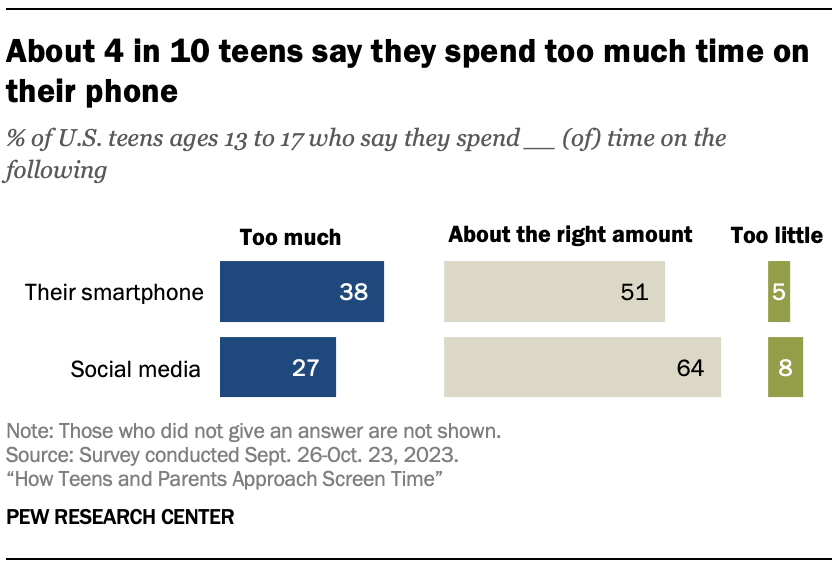
More teens say they spend too much time on their phone or social media than say they don’t spend enough time on them. We found that 38% of teens say they spend too much time on their smartphone. About a quarter say the same regarding their social media use.2
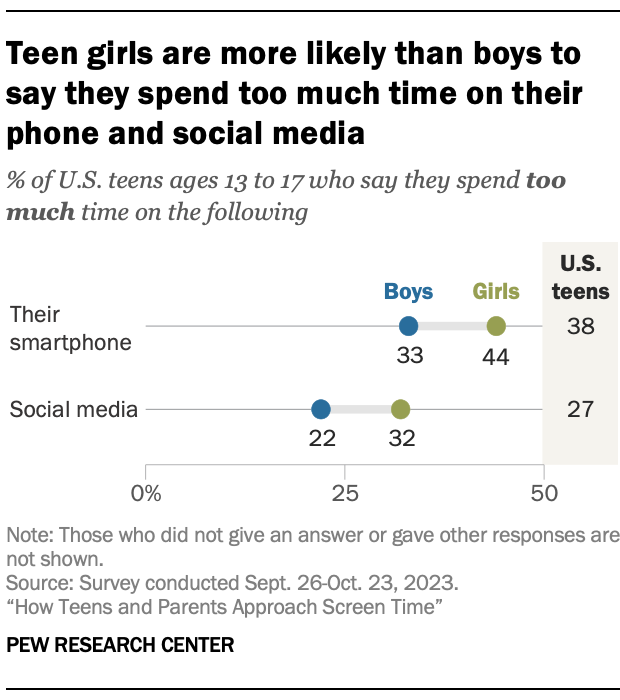
But the largest shares say the amount of time they spend on their phone (51%) or on social media (64%) is about right. Relatively few teens say they don’t spend enough time with these technologies.
Views on this differ by gender. Teen girls are more likely than boys to say they spend too much time on their smartphone (44% vs. 33%) or social media (32% vs. 22%).
Teens’ efforts to curb their screen time
A minority of teens have taken steps to reduce their screen time. Roughly four-in-ten teens (39%) say they have cut back on their time on social media. A similar share says the same about their phone (36%).
Still, most teens have not limited their smartphone (63%) or social media (60%) use.
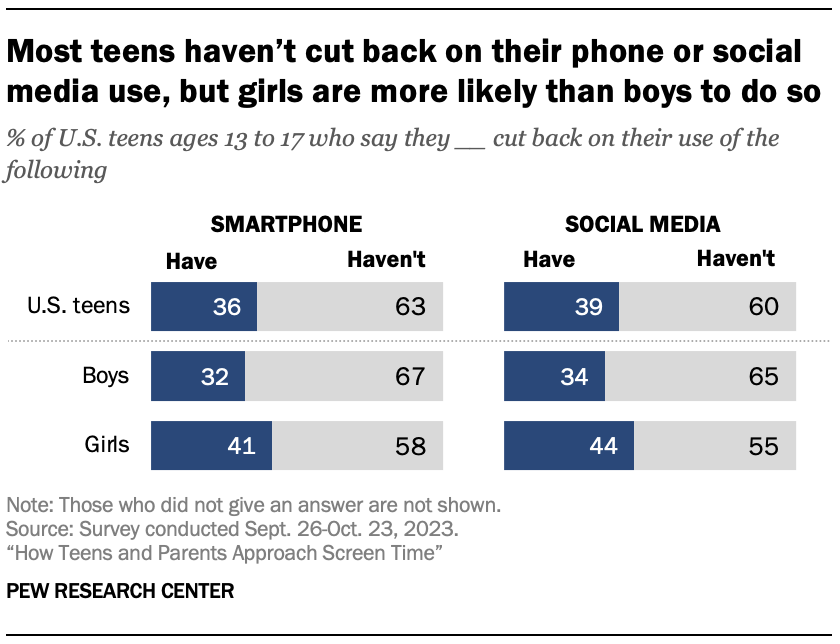
How teens’ behaviors vary by gender
About four-in-ten or more girls say they have cut back on their smartphone or social media use. For boys, those figures drop to roughly one-third.
How teens’ behaviors vary based on their screen time
Teens who report spending too much time on social media and smartphones are especially likely to report cutting back on each. For instance, roughly six-in-ten teens who say they are on social media too much say they have cut back (57%). This is far higher than the 32% among those who say they are on social media too little or the right amount.
How teens feel when they don’t have their phone
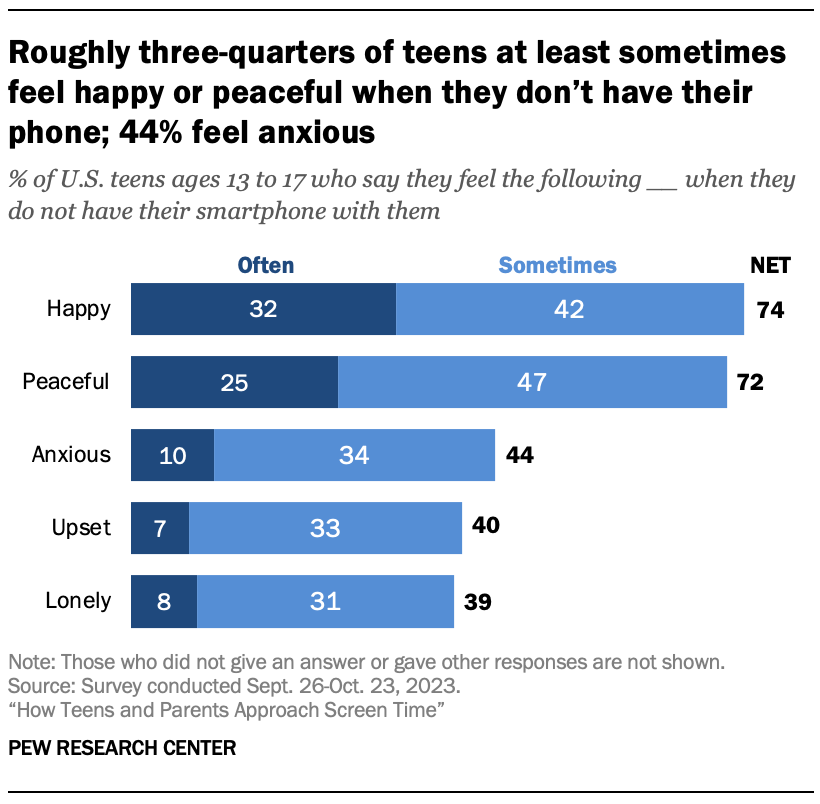
Teens encounter a range of emotions when they don’t have their phones, but we asked them about five specific ones. Roughly three-quarters of teens say it often or sometimes makes them feel happy (74%) or peaceful (72%) when they don’t have their smartphone.
Smaller but notable shares of teens equate not having their phone with more negative emotions. Teens say not having their phone at least sometimes makes them feel anxious (44%), upset (40%) and lonely (39%).
It is worth noting that only a minority of teens – ranging from 7% to 32% – say they often feel these emotions when they’re phone-less.
Teens’ feelings on this differ by some demographic factors:
- Age and gender: Older girls ages 15 to 17 (55%) are more likely than younger girls (41%) and teen boys who are younger (41%) and older (40%) to say they feel anxious at least sometimes when they don’t have their smartphone.
- Gender: 45% of teen girls say not having their phone makes them feel lonely regularly, compared with 34% of teen boys.
Do teens think smartphones are negatively impacting young people?
As smartphones have become a universal part of teen life, many have asked what impact, if any, phones are having on today’s youth.
Teens shared their perspectives on smartphones’ impact on people their age and whether these devices have made certain aspects of growing up more or less challenging.
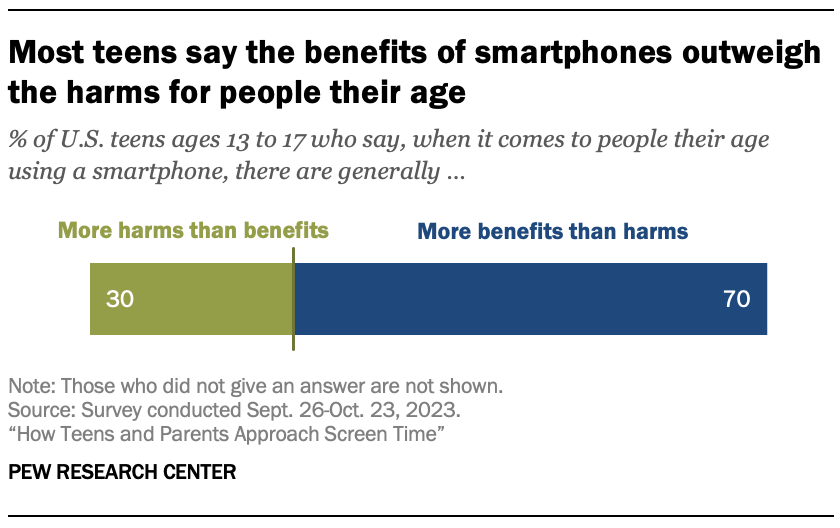
Most teens think the benefits of smartphones outweigh the harms for people their age. Seven-in-ten teens say smartphones provide more benefits than harms for people their age, while a smaller share (30%) take the opposing view, saying there are more harms than benefits.
Teens’ views, by gender and age
Younger girls ages 13 and 14 (39%) are more likely than older teen girls (29%) and teen boys who are younger (29%) and older (25%) to say that the harms of people their age using smartphones outweigh the benefits.
The survey also shows that teens see these devices’ impacts on specific aspects of life differently.
More teens believe smartphones make it easier, rather than harder, to be creative, pursue hobbies and do well in school. Majorities of teens say smartphones make it a little or a lot easier for people their age to pursue hobbies and interests (69%) and be creative (65%). Close to half (45%) say these devices have made it easier for youth to do well in school.
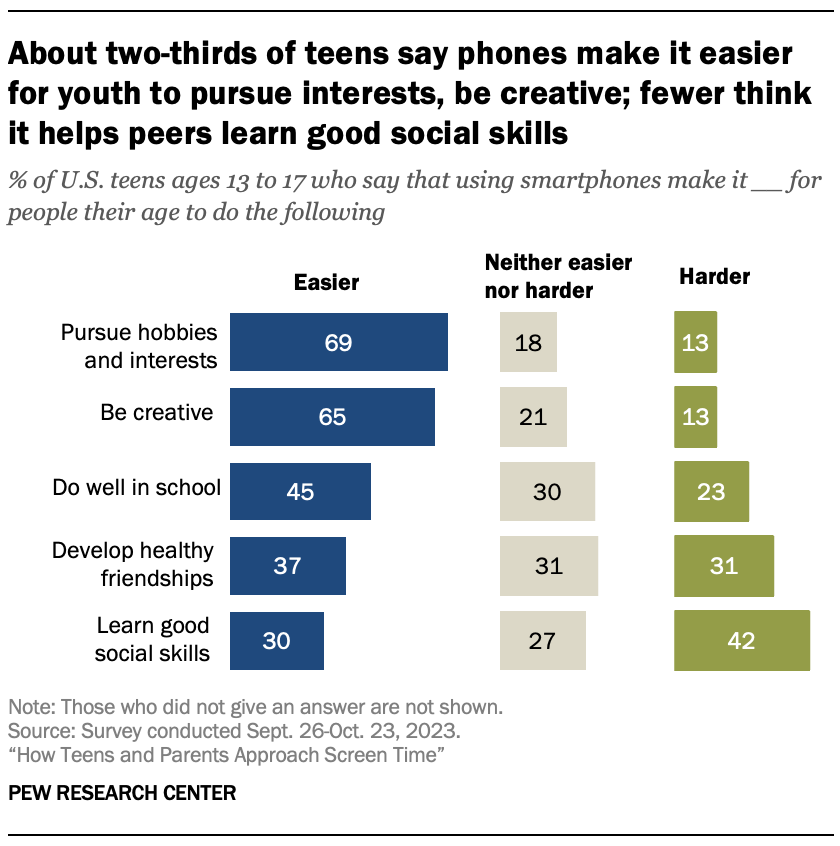
Views are more mixed when it comes to developing healthy friendships. Roughly four-in-ten teens say smartphones make it easier for teens to develop healthy friendships, while 31% each say they make it harder or neither easier nor harder.
But they think smartphones have a more negative than positive impact on teens’ social skills. A larger percentage of teens say smartphones make learning good social skills harder (42%) rather than easier (30%). About three-in-ten say it neither helps nor hurts.
How parents navigate raising teens in the smartphone age
With the rise of smartphones, today’s parents must tackle many questions that previous generations did not. How closely should you monitor their phone use? How much screen time is too much? And how often do phones lead to disagreements?
We developed a set of parallel questions to understand the perspectives of both parents and teens. Here’s what we found:
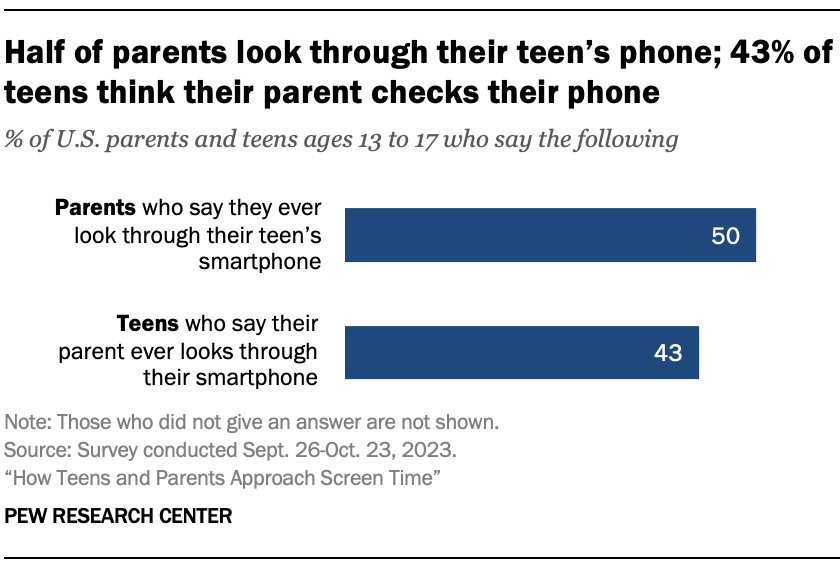
It’s common for parents to look through their teen’s phone – and many of their teens know it. Half of parents of teens say they look through their teen’s phone. When we asked teens if they thought their parents ever look through their phones, 43% believed this had happened.
Whether parents report looking through their child’s smartphone depends on their kid’s age. While 64% of parents of 13- to 14-year-olds say they look through their teen’s smartphone, this share drops to 41% among parents of 15- to 17-year-olds.
Teens’ accounts of this also vary depending on their age: 56% of 13- to 14-year-olds say their parent checks their smartphone, compared with 35% of teens ages 15 to 17.
How often do parents and teens argue about phone time?
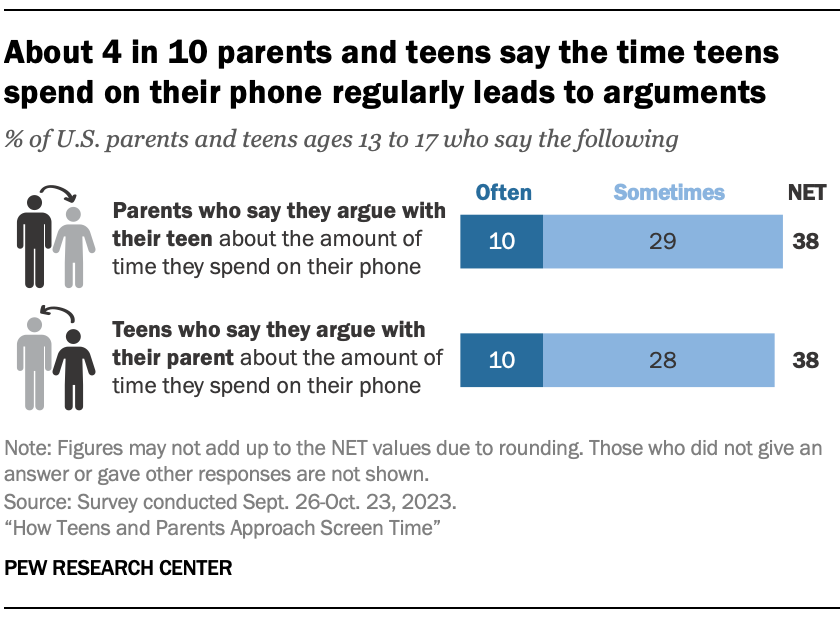
Parents and teens are equally likely to say they argue about phone use. Roughly four-in-ten parents and teens (38% each) say they at least sometimes argue with each other about how much time their teen spends on the phone. This includes 10% in each group who say this happens often.
Still, others say they never have these types of disagreements. One-quarter of parents say they never argue with their teen about this, while 31% of teens say the same.
Teens’ and parents’ views, by race and ethnicity
Hispanic Americans stand out for reporting having these disagreements often. While 16% of Hispanic teens say they often argue with their parent about how much time they’re spending on their phone, that share drops to 9% for White teens and 6% for Black teens.3
A similar pattern is present among parents. Hispanic parents (19%) are more likely than White (6%) or Black (7%) parents to say they often argue with their teen about this.
Teens’ views, by frequency of internet use
The amount of time teens report being online is also a factor. About half (47%) of teens who report being online almost constantly say they at least sometimes argue with their parent about the amount of time they spend on their phone, compared with those who are online less often (30%).
How much do parents prioritize tracking their teen’s phone use?
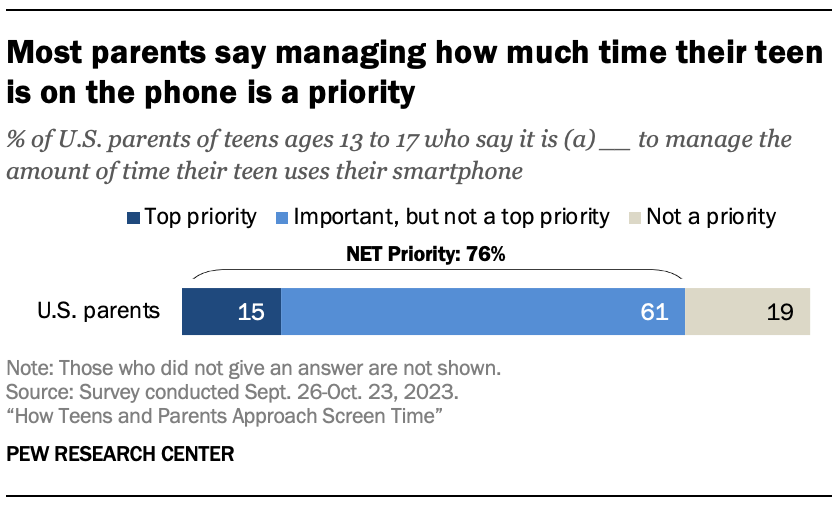
Most parents prioritize managing the amount of time their teen spends on the phone. Roughly three-quarters of parents (76%) say managing how much time their teen spends on the phone is an important or a top priority. Still, 19% of parents don’t consider this a priority.
Parents’ views, by race and ethnicity
Majorities of parents across racial and ethnic groups think of this as a priority. But some groups stand out for how much they prioritize this. For example, Hispanic (25%) or Black (24%) parents are more likely to say managing how much time their teen is on the phone is a top priority. That share drops to 10% among White parents.
Parents’ views, by household income
We also see differences between the lowest and highest income households: 22% of parents whose annual household income is less than $30,000 consider managing the amount of time their teen is on the phone a top priority, compared with 14% of those whose household income is $75,000 or more a year. Those whose household income is $30,000 to $74,999 a year do not meaningfully differ from either group.
Do parents set time limits on their teen’s phone use?
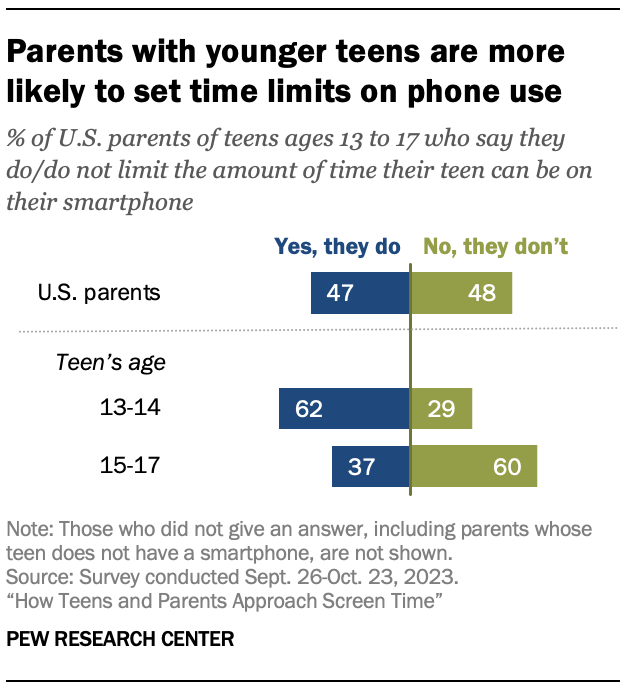
There’s a nearly even split between parents who restrict their teen’s time on their phone and those who don’t. About half of parents (47%) say they limit the amount of time their teen can be on their phone, while a similar share (48%) don’t do this.
Parents’ views, by teen’s age
Parents of younger teens are far more likely to regulate their child’s screen time. While 62% of parents of 13- to 14-year-olds say they limit how much time their teen can be on their phone, that share drops to 37% among those with a 15- to 17-year-old.
How difficult is it for parents to keep up with their teen’s phone use?
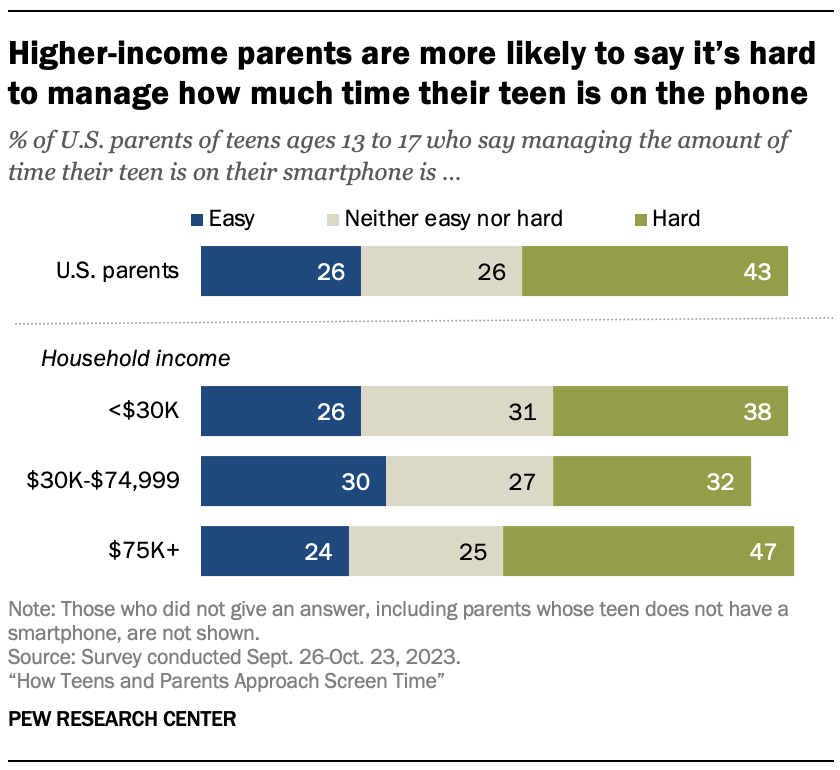
Managing screen time can feel like an uphill battle for some parents. About four-in-ten say it’s hard to manage how much time their teen spends on their phone. A smaller share (26%) says this is easy to do.
Another 26% of parents fall in the middle – saying it’s neither easy nor hard.
Parents’ views, by household income
Higher-income parents are more likely to find it difficult to manage their teen’s phone time. Roughly half (47%) of parents living in households earning $75,000 or more a year say managing the amount of time their teen is on their phone is hard. These shares are smaller among parents whose annual household income falls below $30,000 (38%) or is between $30,000 and $74,999 (32%).
Parents’ own struggles with device distractions, screen time
Teens aren’t the only ones who can be glued to their phones. Parents, too, can find themselves in an endless cycle of checking emails, text messages and social media.
With that in mind, we asked parents to think about their own screen time – both the time they spend on their phone, and if it ever gets in the way of connecting with their teen.
Do parents think they spend too much time on their phone?
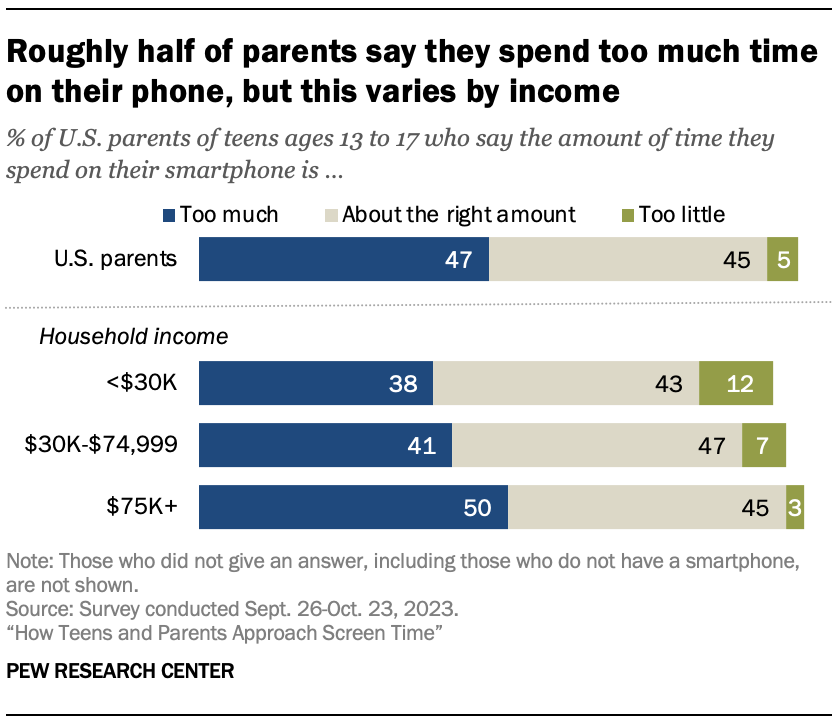
Like teens, parents are far more likely to say they spend too much rather than not enough time on their phone. About half of parents (47%) say they spend too much time on their smartphone. Just 5% think they spend too little time on it. And 45% believe they spend the right amount of time on their phone.
Parents’ views differ by:
- Household Income: 50% of parents with annual household incomes of $75,000 or more say they spend too much time on their phone. This share drops to 41% among those living in households earning $30,000 to $74,999 a year and 38% among those earning under $30,000.
- Race and ethnicity: 57% of White parents believe they spend too much time on their phone, compared with 38% of Black parents and 34% of Hispanic parents.
How often are parents distracted by their phone when talking with their teen?
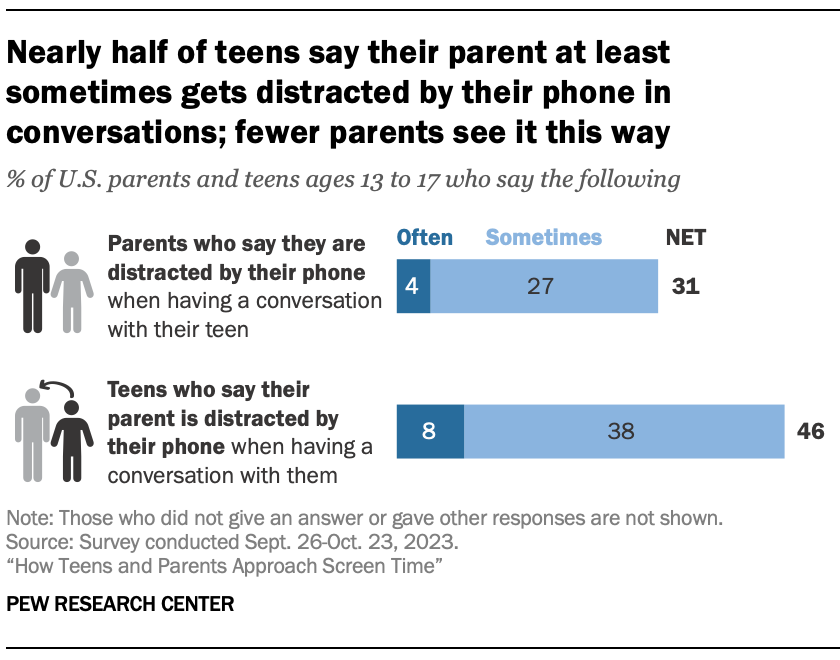
When it comes to distracted parenting, parents paint a rosier picture than teens. Nearly half of teens (46%) say their parent is at least sometimes distracted by their phone when they’re trying to talk to them, including 8% who say this happens often.
But when parents were asked to assess their own behavior, fewer – 31% – say this happens regularly.




